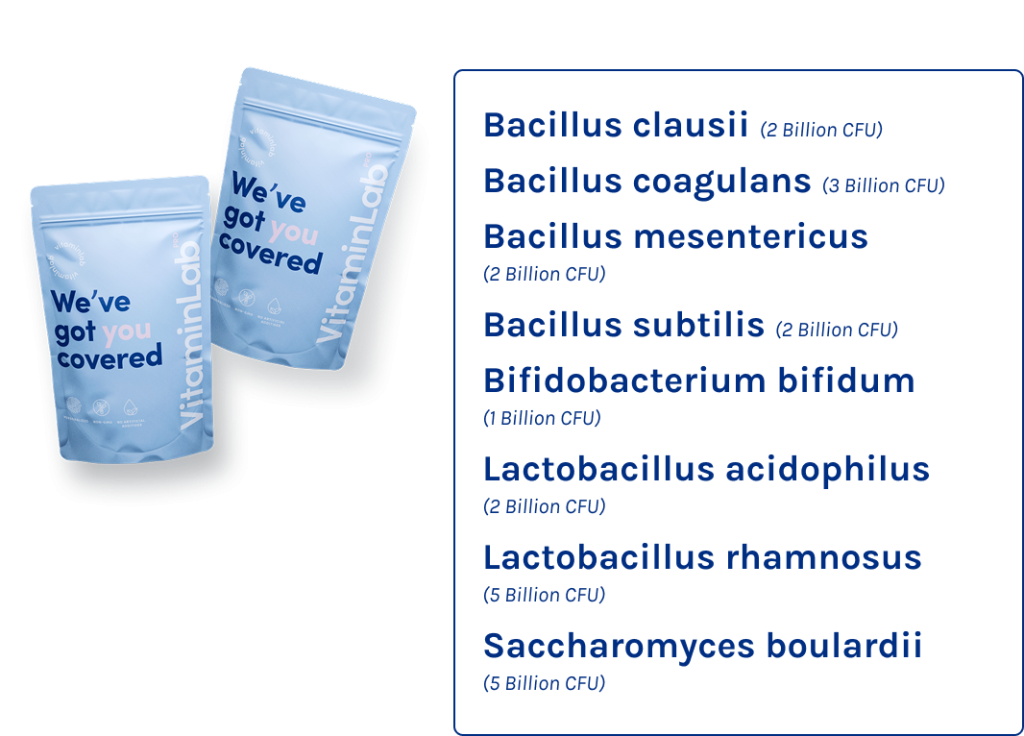Better digestion starts with a balanced microbiome.
Your gut is home to trillions of microbes but only a few have the power to truly transform your health.
When it comes to gut health, the details matter. The right probiotic strains can restore microbial balance, strengthen the intestinal barrier, and regulate immune function.
VitaminLab’s Advanced Probiotic Support Formula provides a blend of spore-forming bacteria, beneficial microbes, and yeast-based probiotics. Practitioners have exclusive access to this protocol in our portal. Consumers looking for probiotic options can include these when creating their custom VitaminLab formula.

Why Gut Health Matters
Your gut microbiome isn’t just about digestion. It’s a living ecosystem that influences inflammation, nutrient absorption, mood, and even immunity.
Stress, antibiotics, travel, and dietary choices can disrupt this balance, leading to bloating, irregularity, or fatigue.
Clinically supported probiotics help restore equilibrium, supporting both short-term relief and long-term microbiome resilience.
The VitaminLab Difference
VitaminLab’s Advanced Probiotic Support Formula isn’t one-size-fits-all (find out why True Personalization is better than Pill Packs here).
The formulation offers a clinically validated foundation for addressing digestive dysfunction, inflammation, or immune imbalance with the flexibility to pair it with complementary products like VitaminLab GI Repair for comprehensive GI recovery.
Curious about VitaminLab’s Quality Standards? Find out more here.
What’s Inside: Key Protocol Ingredients
Bacillus clausii – 2 Billion CFU
A resilient spore-forming probiotic shown to withstand gastric acid and colonize the intestine. B. clausii is known for its immunomodulatory properties, supporting both innate and adaptive immunity. Clinical studies show benefits in restoring gut microbiota homeostasis (1, 2).
Bacillus coagulans – 3 Billion CFU
Known for its ability to survive stomach acid and help regulate gut flora. Research shows this strain improves bloating, abdominal pain, and stool regularity in individuals with IBS and dysbiosis. It also supports immune function and anti-inflammatory balance (3).
Bacillus mesentericus – 2 Billion CFU
Traditionally used in Japanese gut formulations, this strain supports digestive enzyme production and encourages the growth of other beneficial microbes. It’s often used in synbiotic blends to amplify probiotic colonization and support nutrient absorption in elderly populations (4).
Bacillus subtilis – 2 Billion CFU
A well-researched soil-based probiotic known for promoting intestinal barrier integrity, reducing inflammatory markers, and resisting pathogenic bacterial overgrowth. It plays a key role in detoxifying the gut, supporting SCFA production, and modulating immune pathways (5).
Bifidobacterium bifidum – 1 Billion CFU
A core member of the gut microbiota, B. bifidum supports the breakdown of complex carbohydrates and maintains intestinal barrier function. It also helps crowd out harmful bacteria and has been linked to improvements in IBS symptoms and immune response (6).
Lactobacillus acidophilus – 2 Billion CFU
One of the most studied probiotic strains, L. acidophilus supports gut HP balance and may prevent pathogen colonization. It’s beneficial in reducing diarrhea, gas, and bloating, particularly after antibiotics or during travel (7).
Lactobacillus rhamnosus – 5 Billion CFU
Clinically shown to improve diarrhea outcomes, vaginal microbiome balance in women, and eczema symptoms in children, L. rhamnosus is one of the most effective and researched probiotics available. It enhances gut-immune communication and reduces intestinal inflammation (8).
Saccharomyces boulardii – 5 Billion CFU
A probiotic yeast with strong evidence in managing antibiotic-associated diarrhea, Clostridioides difficile infections, and traveler’s diarrhea. It helps restore intestinal homeostasis, prevents pathogen binding, and supports gut lining repair. Unlike bacterial probiotics, it is not killed by antibiotics (9).

Designed to Support your Practice
Healthcare practitioners can now easily integrate Advanced Probiotic Support into custom formulations within VitaminLab’s Practitioner Portal.
By combining clinically validated strains with personalized supplementation, this protocol offers a truly personalized approach to restoring balance and resilience from the inside out. Discover the differences between a Formula and a Protocol here.
For Healthcare Practitioners: Add to your Patients Formula
Access the full protocol and clinical dosing options inside your Practitioner Portal.
For Consumers: Personalize Your Gut Health
Create Your Custom Probiotic Formula:
Take advantage of these same gut helping ingredients by creating your own custom probiotic formula to your personal formula.
Build a formula that combines Advanced Probiotic Support with other ingredients for immune, digestive, or metabolic health, all blended into your personalized vitamin that’s truly yours – no one else’s . Practitioners have exclusive access to this protocol in our portal. Consumers looking for probiotic options can include these when creating their custom VitaminLab formula.
Get started with a formula blend tailored to your digestion and immune goals.
Start Your Personalized Formula
References
- Lopetuso, L. R., Scaldaferri, F., Franceschi, F., & Gasbarrini, A. (2016). Bacillus clausii and gut homeostasis: state of the art and future perspectives. Expert review of gastroenterology & hepatology, 10(8), 943–948. https://doi.org/10.1080/17474124.2016.1200465
- Rosa María Wong-Chew, Jo-Anne A de Castro, Lorenzo Morelli, Marcos Perez, Metehan Ozen.Gut immune homeostasis: the immunomodulatory role of Bacillus clausii, from basic to clinical evidence (2022) Expert Rev Clin Immunol. 2022 Jul;18(7):717-729.
https://pubmed.ncbi.nlm.nih.gov/35674642/ - Madempudi, R. S., Ahire, J. J., Neelamraju, J., Tripathi, A., & Nanal, S. (2019). Randomized clinical trial: the effect of probiotic Bacillus coagulans Unique IS2 vs. placebo on the symptoms management of irritable bowel syndrome in adults. Scientific reports, 9(1), 12210. https://doi.org/10.1038/s41598-019-48554-x
- Gou, H. Z., Zhang, Y. L., Ren, L. F., Li, Z. J., & Zhang, L. (2022). How do intestinal probiotics restore the intestinal barrier?. Frontiers in microbiology, 13, 929346. https://doi.org/10.3389/fmicb.2022.929346
- Liu, S., Cai, P., You, W., Yang, M., Tu, Y., Zhou, Y., Valencak, T. G., Xiao, Y., Wang, Y., & Shan, T. (2025). Enhancement of gut barrier integrity by a Bacillus subtilis secreted metabolite through the GADD45A-Wnt/β-catenin pathway. iMeta, 4(2), e70005. https://doi.org/10.1002/imt2.70005
- Ruiz, L., et al. (2017). Bifidobacteria and their molecular communication with the immune system. Frontiers in Microbiology, 8, 2345. https://doi.org/10.3389/fmicb.2017.02345
- Doron, S., Snydman, D. R., & Gorbach, S. L. (2005). Lactobacillus GG: bacteriology and clinical applications. Gastroenterology clinics of North America, 34(3), 483–ix. https://doi.org/10.1016/j.gtc.2005.05.011
- Kalliomäki, M., Salminen, S., Arvilommi, H., Kero, P., Koskinen, P., & Isolauri, E. (2001). Probiotics in primary







